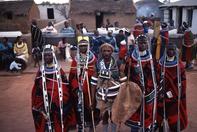Strong Patriarchal Attitudes
Strong patriarchal attitudes and practices are evident in Ndebele communities. More than many other groups, Ndzundza men - especially those of chiefly background - continue to practise polygyny.

The power and authority of patriarchs owe something to the period these people spent as labour tenants on white farms. Demands for family labour were channelled through the male head, which bolstered his authority.
With the move away from the white farms, many men started their own businesses as taxi drivers or builders, in contrast to working on the mines or in industry as their Pedi neighbours had been doing for many years.
The women from KwaNdebele would work for years as domestic servants in Pretoria and then return home to set up a homestead and look after children while being supported by their husbands.
Making and selling beadwork, mats, dolls and other crafts have also provided some Ndebele women with an independent livelihood - both those who have become internationally famous like Esther Mahlangu, and those with humbler aspirations.